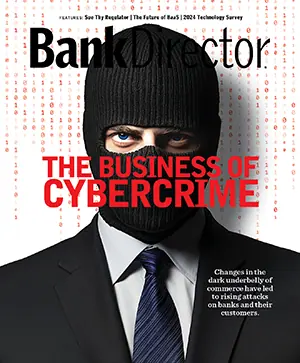
Funding for Community Banks: Meeting the Challenge Head On
Combating the shortage of deposits is becoming a real challenge for the nation’s financial institutions, particularly community banks.
In today’s soaring economy, many bankers are finding that they are not attracting the deposits needed to meet loan demand. The competition for funds has become increasingly intense as the stock market has escalated; savers are lured to the higher returns promised by the equity markets. Increasing demand for stock investments and a ho-hum attitude toward interest-bearing deposit accounts spells real trouble for banks as long as equity markets continue to buzz.
The safety of capital offered by government-insured bank deposits loses its appeal when investors are exuberant about stock markets that are returning 20%-30% gains per year. Today’s equity investors are determined to stay in stocks for the long run; thus, even fairly violent market fluctuations have not changed these “long-haul” investors’ determination to own stocks rather than debt securities.
How can bankers meet the challenge? There are no easy answers; however, a number of things might help community bankers obtain additional funding. (Note that I said “help,” since I know of no guaranteed way to obtain increased deposits in small banks.) Here are some suggestions.
First, customers are always more willing to make deposits if the process is made easier for them. All forms of deposit collections availableu00e2u20ac”home banking, ATMs, branches, grocery store kiosks, and the likeu00e2u20ac”must be employed. Interest rates paid to customers must be extremely competitive. No more relying on customers’ lethargy to keep their funds in low-rate deposits accounts. And big depositors must get lots of TLC (tender loving care).
Second, bankers can pray for a big drop in the “irrational exuberance” of the stock markets. In 1987, when the Dow Jones fell by 20% in one day, investors bailed out of the stock market and put their money in banks, resulting in a flood of new deposits. So far this hasn’t happened again, despite last fall’s 10%-15% equity market dive. Still, hoping for a crash as a means of correcting the banks’ funding shortage is almost un-American (though Fed Chairman Greenspan seems to be doing it). Therefore, depending on the end of “irrational exuberance” to save the day is a weak reed on which to pin one’s hopes.
Third, bankers can support legislative proposals to increase the amount of funding that can be obtained from the Federal Home Loan Bank System. The possibility of such a proposal becoming law is in doubt, but if such a law does pass, I predict important new funding opportunities will result. For small banks, this government-sponsored enterprise (GSE) funding source could be the most important part of any broad-based financial modernization law. But too much GSE financing also could be dangerous, in and of itself. What the government giveth, the government can taketh away.
Fourth, banks can offer equity-based CDs that provide interest returns based on equity market performance. This requires some fairly sophisticated hedging, but some banks are offering those products successfully.
Fifth, small banks can help develop open market sources of funding now generally available to larger banks. These funds are sold by a few investment banking firms but usually require interest payments at considerably higher rates than those paid on insured deposits. The “brokered deposits” provided by investment banks in the 1980s are a prototype. Wouldn’t it be poetic justice if regulators decided to push those bundled deposits to help the safety and soundness of the banks?
The bottom line is that bankers need to develop a market solution to the problem. The market will provide funding if community bankers work together to make the demand large enough to get investment banks’ attention.
Of course, bankers should not forget that they could join the enemy and recover lost spread income by getting into the sale of securities and mutual funds. “If you can’t lick ’em, join ’em.”
Like most other problems, in time, this funding problem “too, will pass.” But in the long run, we will all be departing the scene, so for today, taking action seems the preferable course for solving a serious evolving problem.

Join OUr Community
Bank Director’s annual Bank Services Membership Program combines Bank Director’s extensive online library of director training materials, conferences, our quarterly publication, and access to FinXTech Connect.
Become a Member
Our commitment to those leaders who believe a strong board makes a strong bank never wavers.

